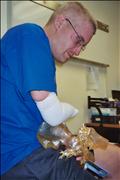Army Fixing Patients' Housing-WP 2/20/07
Army Fixing Patients' Housing
Changes Underway At Walter Reed
By Dana Priest and Anne
Tuesday, February 20, 2007; A01
The facility's commander, Maj. Gen. George W. Weightman, said Army staff members inspected each of the 54 rooms at the building and discovered that outstanding repair orders for half the rooms had not been completed. He said that mold removal had begun on several rooms and that holes in ceilings, stained carpets and leaking faucets were being fixed.
Walter Reed, the Army's premier medical facility, has turned into a holding ground for wounded soldiers during 5 1/2 years of sustained combat. Almost 700 outpatients suffering from physical injuries and psychological problems live on the 113-acre military post or in nearby quarters. Many linger there for 18 months or longer as they move through the Army's numbing bureaucracy.
A Washington Post series over the weekend described "The Other Walter Reed," where overdoses, suicide attempts and depression among outpatients are the parallel narrative to the spit-polish hallways of the renowned hospital.
Building 18, in particular, symbolizes the indifference and neglect that many of the wounded say they experience at Walter Reed.
Yesterday, Weightman said a broken elevator in the building had been repaired and soldiers were working to improve the outside of the building, including removing ice and snow. The slippery conditions have kept some soldiers in their rooms. A garage door that has been broken for months will soon be repaired as well.
Spec. Jeremy Duncan, whose room has a moldy wall that was featured in one photograph in the Post series, has been moved to another room while workers make repairs.
Walter Reed and Army officials have been "meeting continuously for three days" since the articles began appearing, Weightman said. A large roundtable meeting with Army and Defense Department officials will take place at the Pentagon early this morning to continue talks about improvements in the outpatient system, he added.
Weightman said the medical center has received an outpouring of concern about conditions and procedures since the articles appeared and has taken steps to improve what soldiers and their families describe as a messy battlefield of bureaucratic problems and mistreatment.
"We're starting to attack how we'll fix and mitigate" some of the problems, he said.
Social workers will now be stationed around the clock at Mologne House, the 200-room hotel on the post where many of the outpatients live. Plans are being developed to better train other staff members who deal with outpatient needs.
The Army will also consider moving some outpatients to its other medical centers throughout the


0 Comments:
Post a Comment
<< Home